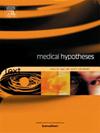Hypothesizing the interplay of thrombus formation, wall enhancement, and perifocal edema as predictive factors for rupture in brain AVMs
IF 2.1
4区 医学
Q3 MEDICINE, RESEARCH & EXPERIMENTAL
引用次数: 0
Abstract
The presence of shear stress within intracranial AVMs (arteriovenous malformations) due to high flow, perinidal angiogenesis, intranidal aneurysms, and biological factors are presumed risk factors for rupture. However, emerging imaging and histological evidence suggests that risk factors for AVM rupture may extend beyond the classical understanding. The presence of perifocal edema at the time of rupture, luminal thrombosis, and vessel wall enhancement on vessel wall MRI elucidate the possibility of an underlying inflammatory process within AVMs, which may predispose them to instability and eventual rupture. We hypothesize that for some AVM ruptures, the occurrence of thrombosis within vascular outpouchings of the AVM initiates a cascade of events, including local hypoxia, inflammation, breakdown of the blood–brain barrier and wall matrix degradation, which is evident from the presence of perifocal edema and vessel wall enhancement observed on imaging. These changes might ultimately raise the risk of AVM rupture and subsequent hemorrhage. Understanding this inflammatory component offers promising insights into AVM pathogenesis and may facilitate the development of preventive strategies to mitigate rupture risk.
推测血栓形成、壁强化和灶周水肿的相互作用是脑动静脉畸形破裂的预测因素
颅内动静脉畸形(动静脉畸形)内由于高流量、潮周血管生成、潮内动脉瘤和生物因素而产生的剪切应力被认为是导致破裂的危险因素。然而,新出现的成像和组织学证据表明,动静脉畸形破裂的风险因素可能超出了传统的理解。破裂时出现的灶周水肿、管腔血栓形成以及血管壁核磁共振成像显示的血管壁强化,都阐明了动静脉畸形内部可能存在潜在的炎症过程,这可能会导致动静脉畸形不稳定并最终破裂。我们推测,在某些 AVM 破裂的情况下,AVM 血管外袋内血栓的形成会引发一系列事件,包括局部缺氧、炎症、血脑屏障破坏和血管壁基质降解。这些变化最终可能会增加 AVM 破裂和随后出血的风险。了解这种炎症成分有助于深入了解动静脉畸形的发病机制,并有助于制定预防策略以降低破裂风险。
本文章由计算机程序翻译,如有差异,请以英文原文为准。
求助全文
约1分钟内获得全文
求助全文
来源期刊

Medical hypotheses
医学-医学:研究与实验
CiteScore
10.60
自引率
2.10%
发文量
167
审稿时长
60 days
期刊介绍:
Medical Hypotheses is a forum for ideas in medicine and related biomedical sciences. It will publish interesting and important theoretical papers that foster the diversity and debate upon which the scientific process thrives. The Aims and Scope of Medical Hypotheses are no different now from what was proposed by the founder of the journal, the late Dr David Horrobin. In his introduction to the first issue of the Journal, he asks ''what sorts of papers will be published in Medical Hypotheses? and goes on to answer ''Medical Hypotheses will publish papers which describe theories, ideas which have a great deal of observational support and some hypotheses where experimental support is yet fragmentary''. (Horrobin DF, 1975 Ideas in Biomedical Science: Reasons for the foundation of Medical Hypotheses. Medical Hypotheses Volume 1, Issue 1, January-February 1975, Pages 1-2.). Medical Hypotheses was therefore launched, and still exists today, to give novel, radical new ideas and speculations in medicine open-minded consideration, opening the field to radical hypotheses which would be rejected by most conventional journals. Papers in Medical Hypotheses take a standard scientific form in terms of style, structure and referencing. The journal therefore constitutes a bridge between cutting-edge theory and the mainstream of medical and scientific communication, which ideas must eventually enter if they are to be critiqued and tested against observations.
 求助内容:
求助内容: 应助结果提醒方式:
应助结果提醒方式:


